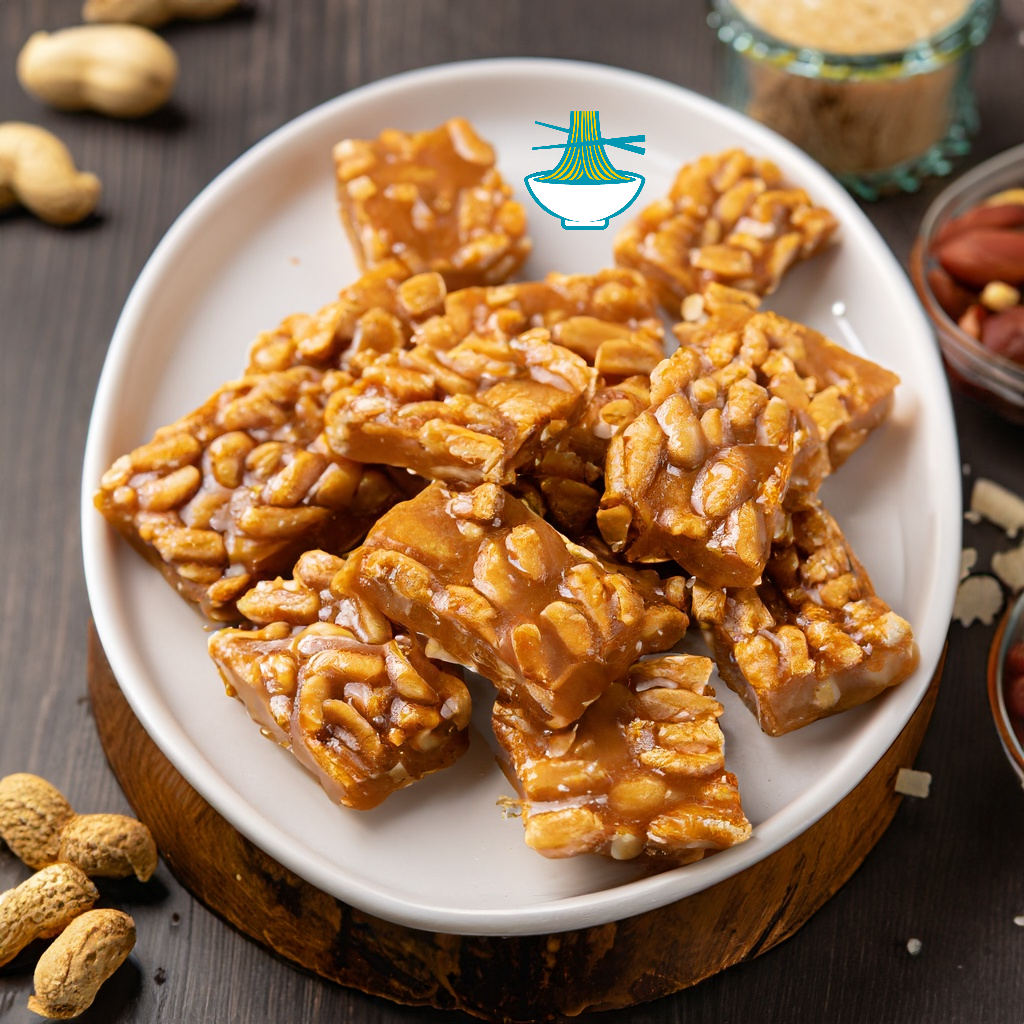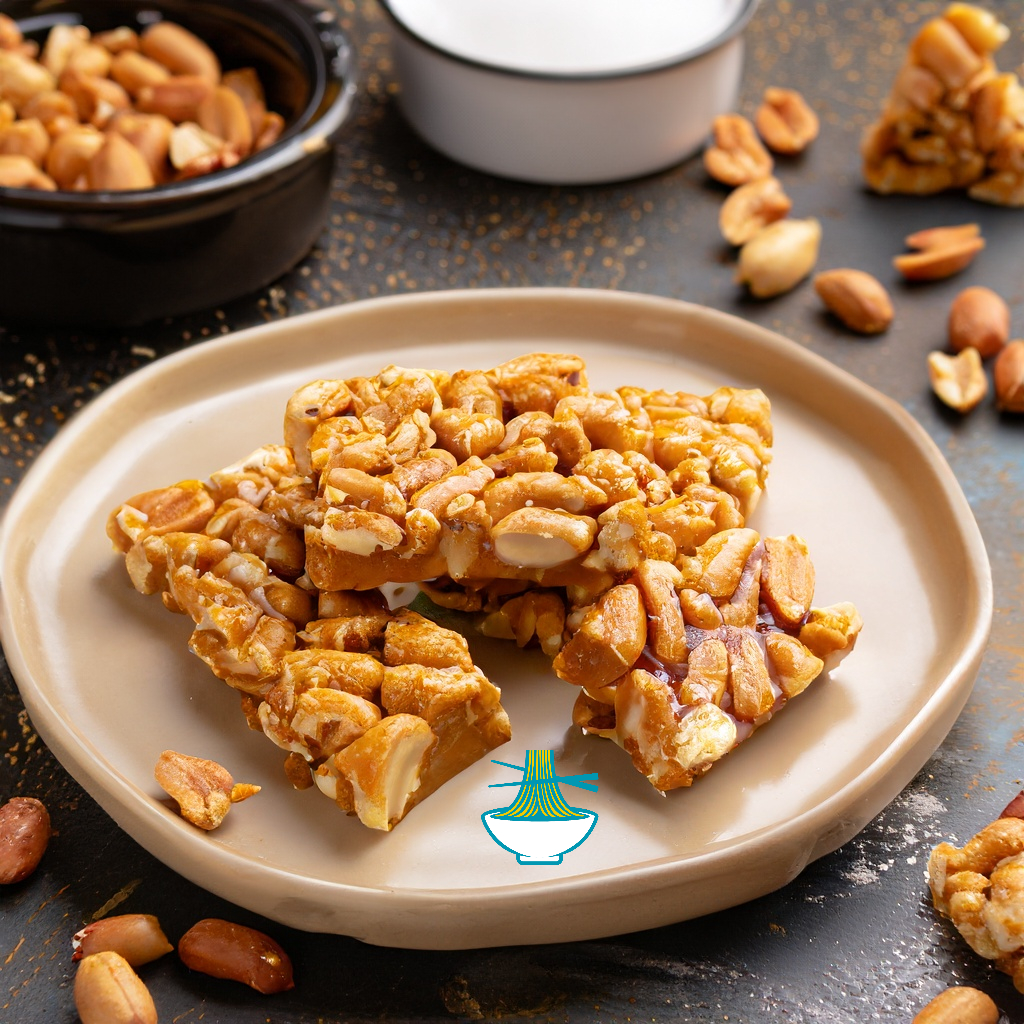Crunchy Peanut Delight Candy, or peanut brittle, is a beloved candy combining sweet and salty flavors with a crispy, crunchy texture. Made from simple ingredients like sugar, corn syrup, roasted peanuts, butter, and baking soda, it’s easy to prepare and can be enjoyed as a snack or dessert topping. While peanuts provide healthy fats and protein, peanut brittle is high in sugar, so it should be eaten in moderation. The candy offers some nutritional benefits from peanuts, but the added sugar and fat make it a high-calorie snack. Always use caution when making peanut brittle, as the hot sugar syrup can be dangerous.
Ingredients:
1- 1 cup granulated sugar
2- 1/2 cup light corn syrup
3- 1/4 cup water
4- 1 cup roasted peanuts
5- 2 tablespoons unsalted butter
6- 1 teaspoon baking soda
7- 1/2 teaspoon salt
Method:
1- Line a baking sheet with parchment paper and set aside.
2- In a medium saucepan, combine the sugar, corn syrup, and water. Cook over medium heat, stirring occasionally, until the sugar has dissolved.
3- Add the peanuts and stir to combine.
4- Continue to cook the mixture over medium heat, stirring occasionally, until it reaches a temperature of 300°F on a candy thermometer.
5- Remove the saucepan from the heat and immediately stir in the butter, baking soda, and salt.
6- Pour the mixture onto the prepared baking sheet and use a spatula to spread it out into an even layer.
7- Allow the peanut brittle to cool completely, then break it into small pieces and serve.
Note:
1- Be careful when working with hot sugar syrup, as it can cause severe burns.
2- It's important to use a candy thermometer to ensure that the mixture reaches the correct temperature.
3- If you prefer, you can use different types of nuts in place of the peanuts.
Nutritional Benefits
- Peanuts: They are a rich source of plant-based protein, heart-healthy fats (monounsaturated and polyunsaturated), and important vitamins and minerals such as vitamin E, magnesium, and folate. These nutrients help support overall health, improve heart health, and contribute to muscle repair and growth.
- Butter: The small amount of unsalted butter used in the recipe adds flavor and creaminess while aiding the absorption of fat-soluble vitamins (A, D, E, and K).
Common Questions About Peanut Brittle
Can I use other nuts instead of peanuts?
- Yes, you can easily substitute peanuts with other nuts such as almonds, cashews, or pecans. Each type of nut will slightly alter the flavor and texture, but all can provide a delicious alternative.
Can I reduce the sugar content in this recipe?
- It is possible to reduce the sugar, but it may affect the final texture. Peanut brittle relies on sugar for both sweetness and texture. You can experiment with using sugar alternatives like stevia or erythritol for a lower-calorie option, but these may alter the taste and consistency.
How should I store peanut brittle?
- Peanut brittle should be stored in an airtight container in a cool, dry place. It will last up to two weeks if stored properly. If it’s humid, it can become sticky, so make sure to keep it in a moisture-free environment.
How can I make this treat healthier?
- To make peanut brittle healthier, you can reduce the sugar content and opt for sugar substitutes. You can also substitute the butter with healthier fats like coconut oil. Additionally, using a mix of nuts rather than just peanuts can increase the variety of nutrients.
What is the precise cooking temperature for making peanut brittle?
- To ensure that the peanut brittle has the correct texture, it’s important to cook the mixture to 300°F (150°C) on a candy thermometer. This is known as the "hard crack" stage, where the sugar mixture reaches the perfect consistency to set into crunchy candy.
Nutrition Facts:
One serving (28g) of peanut brittle contains approximately:
- Calories: 140
- Total Fat: 5g
- Saturated Fat: 1g
- Cholesterol: 5mg
- Sodium: 90mg
- Total Carbohydrate: 22g
- Dietary Fiber: 1g
- Sugars: 20g
- Protein: 2g
Here are the approximate nutrition facts for the listed ingredients in a recipe. Please note that these values may vary depending on the specific brands and quantities used:
1. 1 Cup Granulated Sugar
Nutritional Information (Per 1 cup / 200g):
- Calories: 774
- Carbohydrates: 200g
- Protein: 0g
- Fat: 0g
- Sodium: 0mg
- Cholesterol: 0mg
- Vitamins: None
- Minerals: None
Nutritional Benefits:
- Energy Source: Provides quick energy as it is easily converted to glucose.
- Flavor Enhancer: Adds sweetness and improves the overall flavor of the recipe.
- Browning and Caramelization: Contributes to the texture and color during cooking.
2. 1/2 Cup Light Corn Syrup
Nutritional Information (Per 1/2 cup / 160g):
- Calories: 480
- Carbohydrates: 120g
- Protein: 0g
- Fat: 0g
- Sodium: 20mg
- Cholesterol: 0mg
- Vitamins: None
- Minerals: Trace amounts of potassium
Nutritional Benefits:
- Prevents Crystallization: Helps achieve a smooth texture in candies like peanut brittle.
- Moisture Retention: Keeps the candy moist and prevents it from becoming too hard.
- Sweetness: Adds mild sweetness without overpowering other ingredients.
3. 1/4 Cup Water
Nutritional Information (Per 1/4 cup / 60g):
- Calories: 0
- Carbohydrates: 0g
- Protein: 0g
- Fat: 0g
- Sodium: 0mg
- Cholesterol: 0mg
- Vitamins: None
- Minerals: None
Nutritional Benefits:
- Dissolving Agent: Helps dissolve sugar and combine ingredients evenly.
- Texture: Contributes to the smooth consistency of the candy.
- Heat Conductor: Ensures even heat distribution during cooking.
4. 1 Cup Roasted Peanuts
Nutritional Information (Per 1 cup / 146g):
- Calories: 828
- Carbohydrates: 30g
- Protein: 38g
- Fat: 72g
- Sodium: 5mg
- Cholesterol: 0mg
- Vitamins: Vitamin E (4.2mg), Folate (188mcg)
- Minerals: Magnesium (168mg), Potassium (705mg), Phosphorus (360mg)
Nutritional Benefits:
- Protein: Peanuts are an excellent source of plant-based protein, essential for muscle repair and growth.
- Healthy Fats: Contain heart-healthy fats (monounsaturated and polyunsaturated) that help reduce cholesterol levels.
- Rich in Vitamins and Minerals: Support immune function, heart health, and overall body function (Vitamin E, Magnesium, Folate).
5. 2 Tablespoons Unsalted Butter
Nutritional Information (Per 2 tablespoons / 28g):
- Calories: 204
- Carbohydrates: 0g
- Protein: 0.2g
- Fat: 23g
- Sodium: 2mg
- Cholesterol: 31mg
- Vitamins: Vitamin A (355 IU)
- Minerals: Calcium (3mg), Phosphorus (8mg)
Nutritional Benefits:
- Flavor: Adds a rich, creamy flavor to the candy.
- Texture: Contributes to the smooth texture of the brittle.
- Nutrient Absorption: Helps with the absorption of fat-soluble vitamins (A, D, E, and K).
6. 1 Teaspoon Baking Soda
Nutritional Information (Per 1 teaspoon / 4.6g):
- Calories: 0
- Carbohydrates: 0g
- Protein: 0g
- Fat: 0g
- Sodium: 1,259mg
- Cholesterol: 0mg
- Vitamins: None
- Minerals: Sodium
Nutritional Benefits:
- Leavening Agent: Reacts with acids to release carbon dioxide, helping the candy expand and become airy.
- Texture: Contributes to a light, crispy texture in the candy.
- Neutralizes Acidity: Helps balance pH, ensuring the mixture doesn't become too acidic.
7. 1/2 Teaspoon Salt
Nutritional Information (Per 1/2 teaspoon / 3g):
- Calories: 0
- Carbohydrates: 0g
- Protein: 0g
- Fat: 0g
- Sodium: 1,150mg
- Cholesterol: 0mg
- Vitamins: None
- Minerals: Sodium
Nutritional Benefits:
- Flavor Enhancer: Helps balance the sweetness and enhances the overall flavor of the brittle.
- Preservative: Can extend the shelf life of the candy by inhibiting the growth of bacteria.
- Electrolyte Balance: Contributes to maintaining fluid and electrolyte balance in the body.
Each of these ingredients plays a specific role in the recipe, contributing not only to the flavor and texture of the peanut brittle but also providing essential nutrients in varying amounts.


Comments